Workplace retaliation is a serious issue that can have detrimental effects on employees and organizations alike. In South Carolina, like many other states, the at-will employment doctrine prevails, meaning employers can terminate employees for any reason or no reason at all, as long as it’s not unlawful. Primarily, this means it must violate some anti-retaliatory provision of a workplace law. Through my daily interactions with people who call our law office who believe they’re facing retaliation, I’ve realized that there’s a significant gap in understanding what truly constitutes unlawful retaliation. Let’s shed some light on this topic.
What is Unlawful Retaliation?
Unlawful retaliation in the workplace occurs when an employer takes adverse action against an employee in response to their engagement in legally protected activities. These activities can include:
- Reporting Unlawful Discrimination or Harassment: Not all harassment and discrimination is unlawful. However, employees have the right to report instances of discrimination or harassment based on legally protected characteristics such as race, gender, age, sex, national origin, religion, (including pregnancy) or disability.
- Participating in an Investigation: Employees who cooperate with internal or external investigations into unlawful workplace misconduct are protected from retaliation. Again, the underlying matter being investigated must be unlawful discrimination or harassment.
- Exercising Workplace Rights: In addition to the above, this includes actions such as requesting reasonable accommodations for disabilities, taking leave under the Family and Medical Leave Act (FMLA), or filing complaints with government agencies such as the Equal Employment Opportunity Commission (EEOC), Department of Labor or Occupational Safety and Health Administration (OSHA).
What Unlawful Retaliation is Not
First, being targeted for a work-related disagreement with a manager is not unlawful retaliation. Not every negative experience at work qualifies or gives rise to legal claims, and this is where many misconceptions arise. For instance, if an employer gives a negative performance review, it’s not generally enough to file a claim for retaliation. Similarly, interpersonal conflicts, isolated incidents not related to a legal complaint, or general workplace politics are often not unlawful retaliation. There must be a clear link between a legally protected activity and an adverse action, not just unfortunate timing or unprofessional management practices.
What to Do if You Are a Victim of Unlawful Retaliation:
- Document Everything: Keep detailed records of the retaliatory actions, including dates, times, witnesses, and any relevant communications.
- Seek Internal Remedies: Before jumping to external legal action, consider using your employer’s internal complaint resolution processes. Many times, issues can be resolved internally once brought to the attention of HR or higher management.
- File a Charge: If internal resolution is not possible or fails to address the issue, employees can file a charge of retaliation with the EEOC or other relevant government agencies. https://publicportal.eeoc.gov/
- Seek Legal Counsel: Consulting with an experienced employment attorney can help assess the situation, understand legal rights, and determine the best course of action.
While South Carolina has adopted the at-will employment doctrine, it’s crucial for both employers and employees to understand that retaliation for engaging in protected activities is unlawful under state and federal law. By recognizing the signs of retaliation and taking appropriate steps to address it, individuals can help foster a workplace environment that promotes fairness, respect, and compliance with the law.
Remember, no one should have to endure retaliation for exercising their rights or standing up against wrongdoing in the workplace.
